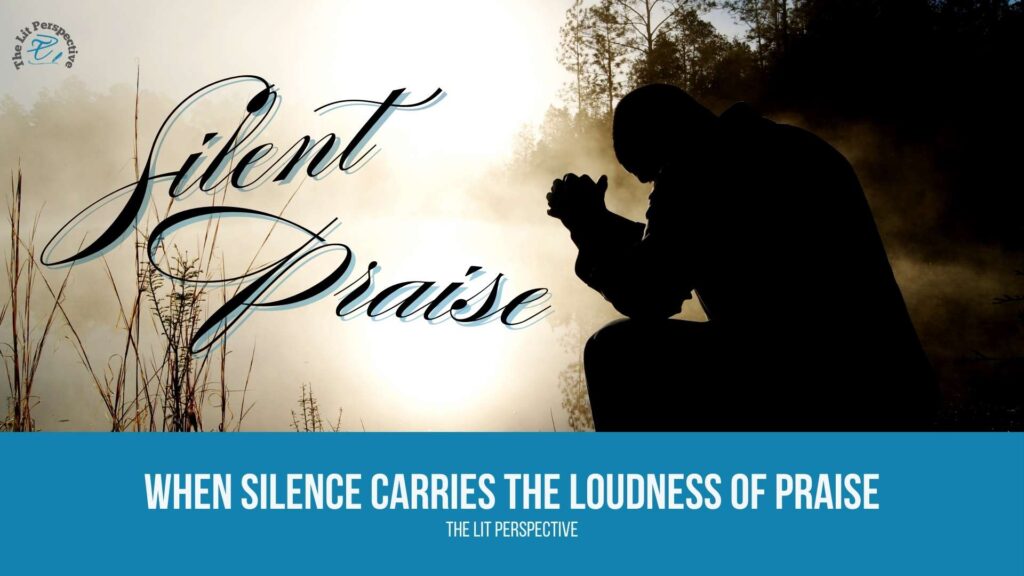TheLitPerspective is your one-stop shop for everything that ignites the spark of curiosity within you.
Silent Praise: When Silence Carries the Loudness of Praise

“Praise God in his sanctuary; praise him in his mighty heavens! Praise him for his mighty deeds, praise him according to his excellent greatness! Praise him with trumpet sound; praise him with lute and harp! Praise him with tambourine and dance; praise him with strings and pipe! Praise him with sounding cymbals; praise him with loud clashing cymbals!”
– Psalm 150:1-6
When people talk about praise, they commonly associate it with a consonance of sound and the loudness of one’s voice. However, there is also power and strength behind silent praise, for the love of God isn’t only observed in loudness but in sincerity.
The louder people’s praise, the more appreciative and dignified they are deemed to be with their devotions. Christians are encouraged to cry out their love and passion for their creator to hear, urged to take pride, and be blatant in their worship. God’s love has long been revered in the sense of harmonious clutter, and his existence is celebrated in the clamor.
But is noise solely how true praise is rightly measured?
Can Praise Be Silent?
Others deem silence problematic, especially in the context of devotion, and there’s a reasonable perspective behind this. Against noise and the ruckus of disbelievers, silent praise can be quickly subdued. It’s regarded as difficult, for it has many enemies, appearing defenseless and ineffectual. In a world where quiet is considered a sign of weakness, loudness considerably triumphs it.
However, praise in silence can still be a good virtue to practice.
In Judith Mackie’s Praise Him, a book teaching people what true praise is, the author never specifies that it should only be done through noise. Countless books discussing the power of praise, likewise, never require it to be done in clamor. If there’s a key ingredient to people’s praise and worship, it’s not commotion or fanfare.
While the scriptures mention God being celebrated in uproar, it doesn’t necessarily have to be. Instead, genuine praise only behooves sincerity regardless of its form.
Praise can be silent. In fact, the Bible commends those who are able to keep such peace and communicate to God their woes in gentleness. It only discourages such when it’s due to timidness.
What Does the Bible Say About Silent Praise?
“There will be silence before You, and praise in Zion, O God,
– Psalm 65:1
And to You the vow will be performed.”
Several verses in the Bible capture the essence of silence, detailing how it’s vital in worship.
Silent praise may not be perceived as forwardly effective as clamor, but it provides a unique form of conversation with God. Compared to fervent celebrations, praise done in silence is more intimate and honest. It doesn’t rely on hubbub but rather opens a space where people are free to speak whatever is in their quieted hearts and minds. It showcases a sense of rawness and vulnerability from people, unraveling a deeper connection with the divine.
This unspoken form of dialogue transcends words. It draws people closer to God as they’re given the solitude to speak without filter, allowing them to tap deep within their hearts. It’s not to complain before him but to lay their thoughts and feelings bare before Him.
To the Bible, silent praise isn’t an absence of worship or an inadequacy of it.
Instead, it’s a profound expression of it. It’s a form of surrender to God and His majesty, where people find solace and peace to connect with their creator. Silent praise may be done in solitude, but within the quiet and calm, people are reminded how they aren’t alone.
There is a higher power that loves them unconditionally, listening to their woes.
This silent conversation with God is a unique experience for people. It’s a space where they’re not only allowed to speak their minds freely but also be reminded of who they’re conversing with. It may not be as enthusiastic as other forms of worship, but this intimate time draws people closer to Him.
What Does Silent Praise Accomplish?
Silent praise gives people the clarity found in calmness and the lull. This allows them to clearly hear what their hearts profoundly want, beyond the physical and trivial desires. The solitude gives people the time to rest in who God is, slowing their hearts and minds down to be one with Him. In this silence, people have no other agenda but to be with Him and soak in His presence.
In silence, people are able to acknowledge better what He’s able to do. They’re given the clarity to surrender before Him, leading them to practice the sincerest means of worship—pure and vulnerable communication. Silent praise allows people to fill their souls with God, grow through His glory, and humble themselves before Him.
Allow yourself to be still and connect with the divine presence. In the quietness and calmness of silence, learn what true praise entails, find a deep meaning of life, and speak to the core of your being. Discover these and more through Praise Him by Judith Mackie.
Grab a copy of the book now!

Witty and whimsy. As a writer, Mia finds a pleasant balance between clever and creative. With years of experience under her name, she aims to add meaning to your life through the articles she writes.







